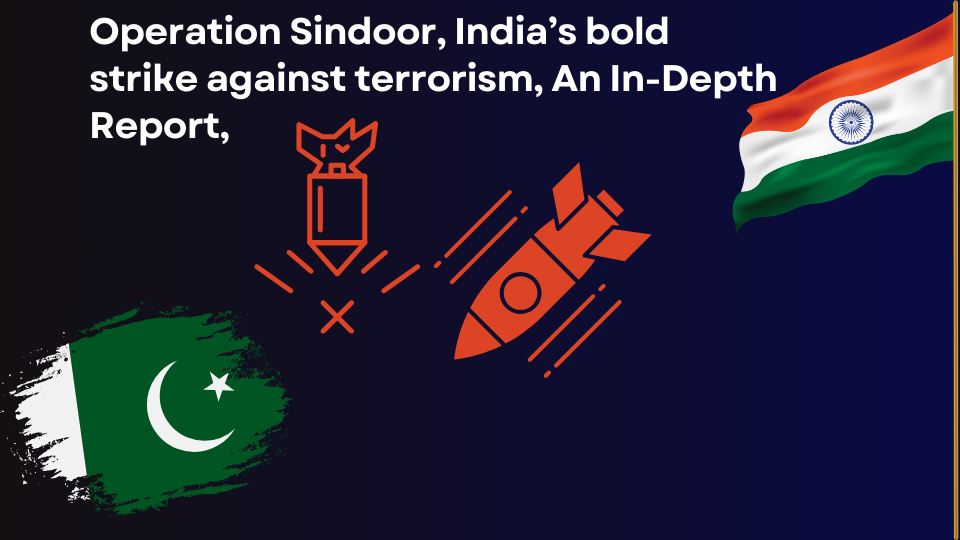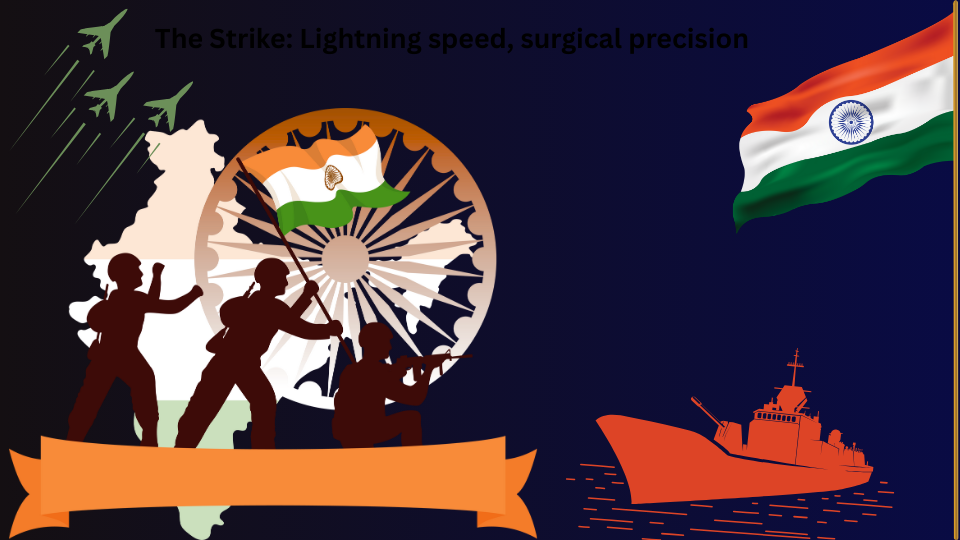On the morning of May 7, 2025, India sent shockwaves across the region with Operation Sindoor, a precision military strike that demolished nine terrorist training camps inside Pakistan and Pakistan-Occupied Kashmir (POK). The operation was India’s powerful answer to the Pahalgam terror attack of April 22, where 26 innocent civilians, including a Nepali tourist, were brutally killed. The nation had demanded justice and this was India’s response.
Key points

The Spark: Pahalgam and the breaking point
The horror unfolded in Pahalgam, a serene tourist town in Jammu & Kashmir, when armed terrorists opened fire on unarmed civilians. The massacre, one of the deadliest in recent years, left families shattered and the country seething. Intelligence reports quickly pointed fingers at Pakistan-based terror groups, reigniting long-standing frustrations over cross-border terrorism.
For over a decade, India has faced relentless attacks, losing hundreds of civilians and soldiers to Pakistan-backed militants. The Pahalgam bloodshed was the final straw. The government, under immense public pressure, decided it was time to hit back hard.
You can see full detail: Pahalgam Terror attack
The Strike: Lightning speed, surgical precision
At 1:05 AM, India’s military machinery swung into action. In just 25 minutes, Operation Sindoor delivered a crushing blow to terror networks. Unlike past operations limited to POK, this time, the strikes went deep into Pakistan’s heartland, proving India’s ability to reach anywhere, anytime.
The Army, Navy, and Air Force worked in flawless sync, firing 24 missiles that turned nine terror hubs into rubble.

The Targets: Crushing the terror network by Operation Sindoor
The Defence Ministry released a list of the destroyed camps:
- Markaz Subhan Allah, Bahawalpur (Jaish-e-Mohammed’s main base)
- Markaz Taiba, Muridke (Lashkar-e-Taiba’s headquarters)
- Sarjal, Tehra Kalan (Jaish’s key training site)
- Mehmoona Joya, Sialkot (Hizbul Mujahideen’s hideout)
- Markaz Ahle Hadith, Barnala (Lashkar’s recruitment center)
- Markaz Abbas, Kotli (Jaish’s operational command)
- Maskar Raheel Shahid, Kotli (Hizbul’s weapons depot)
- Shawai Nalla Camp, Muzaffarabad (Lashkar’s transit point)
- Syedna Bilal Camp, Muzaffarabad (Jaish’s logistics hub)
Sources confirm that around 70 terrorists were wiped out, including top commanders. The biggest blow? Jaish-e-Mohammed chief Maulana Masood Azhar lost 10 family members and four close aides in the Bahawalpur strike sending a chilling message to terror kingpins.
India’s Message: No more games
At a tense press conference, Foreign Secretary Vikram Misri made it clear: “This was not an act of war, but a necessary strike against terror.” He stressed that only terrorist infrastructure was hit no civilians, no military bases.
Defence Minister Rajnath Singh was blunt: “If you spill Indian blood, we will hunt you down.”
PM Narendra Modi, who personally named the operation “Sindoor”, called it a “defining moment for India’s security.” His message was simple India will no longer sit back and take hits.
Pakistan’s Fury and the risk of war after Operation Sindoor
Pakistan reacted with predictable rage. Artillery shells rained down on the LOC, and PM Shehbaz Sharif screamed “revenge.” Pakistan’s military even claimed to have shot down five Indian jets, but no evidence backed the claim global experts dismissed it as propaganda.
The world watched nervously. The US, UK, and UN urged “restraint,” while scrambling diplomats to prevent a full-blown war. A UN team inspected the Muzaffarabad strike site, but India’s precision left little room for criticism.
Global Reactions: Praise, Concern, and Hypocrisy
Media outlets worldwide called it a “masterclass in counter-terror ops.” The New York Times wrote: “India showed restraint, hitting only terror camps.” The BBC, however, fretted over “escalation risks.”
World leaders gave measured responses acknowledging India’s right to defend itself, but pleading for “peace.”
India stands united
At home, even bitter political rivals stood together. The Congress party, usually quick to criticize Modi, backed the military fully. Across the country, security was tightened flights to J&K were suspended, and cities were put on high alert.
What next?
The stakes are sky-high. Pakistan is humiliated and thirsting for revenge, but India has made its point terror will be met with fire. Diplomats are working overtime to prevent another flare-up, but one thing is certain:
Operation Sindoor has changed the game. India is no longer playing defense.
This operation seems like a bold and decisive move by India, but it raises so many questions about the long-term consequences. Was this the only way to respond to the Pahalgam attack, or could there have been a diplomatic solution? The precision and coordination of the military are impressive, but I wonder how Pakistan will react to such a direct strike on its soil. The loss of innocent lives in Pahalgam was heartbreaking, but does this operation truly bring justice, or does it escalate tensions further? It’s hard not to feel conflicted—on one hand, it’s a strong stance against terrorism, but on the other, it feels like a dangerous game of retaliation. What do you think will be the next step for both countries? Do you believe this will deter future attacks, or will it only fuel more violence?
Operation Sindoor was a bold and decisive move by India, showcasing its resolve to combat terrorism head-on. The precision and efficiency of the strike are commendable, especially given the complexity of targeting deep within Pakistan. It’s clear that the Pahalgam attack was a tipping point, and the government’s response reflects the public’s demand for justice. However, such actions inevitably raise questions about the long-term implications for regional stability. Could this escalate tensions further, or will it serve as a deterrent to future attacks? The loss of innocent lives in Pahalgam was tragic, but does this response risk perpetuating a cycle of violence? What measures are being taken to ensure that civilians on both sides are protected in the future? This operation sends a strong message, but is it enough to address the root causes of cross-border terrorism?
This operation is a bold and decisive move by India, showcasing its determination to combat terrorism head-on. The precision and coordination displayed by the military are commendable, especially the fact that it targeted deep within Pakistan. However, such actions raise questions about the long-term impact on regional stability—could this escalate tensions further? While justice for the Pahalgam victims is crucial, one wonders if there are alternative, non-military solutions to address cross-border terrorism. The loss of civilian lives, even on the other side, is tragic and should not be overlooked. How does India plan to ensure that such operations deter future attacks without fueling more hostility? The world is watching—will this mark a turning point in the region, or is it a step toward a more dangerous escalation? Let’s hope for a peaceful resolution moving forward.
Operation Sindoor seems like a bold and calculated move by India to address the long-standing issue of cross-border terrorism. The precision and efficiency of the strike show a level of preparedness that can’t be ignored. However, one has to wonder about the long-term implications of such actions—will this deter terrorism, or escalate tensions further? The loss of civilian lives in the Pahalgam attack was heartbreaking, and it’s understandable why such a response was demanded, but is military retaliation the only solution? The involvement of all three branches of the military in this operation highlights its significance, but could there have been a diplomatic route that was overlooked? The destruction of terror camps and the loss of key figures like Maulana Masood Azhar’s family members sends a strong message, but what’s the next step in preventing such attacks from happening again? Also, how does the international community view this operation—will it be seen as justified or as a provocation? It’s a complex situation, and while the strike may have achieved its immediate goals, the bigger picture still feels uncertain. What do you think—was Operation Sindoor the right move, or does it risk further destabilizing the region?